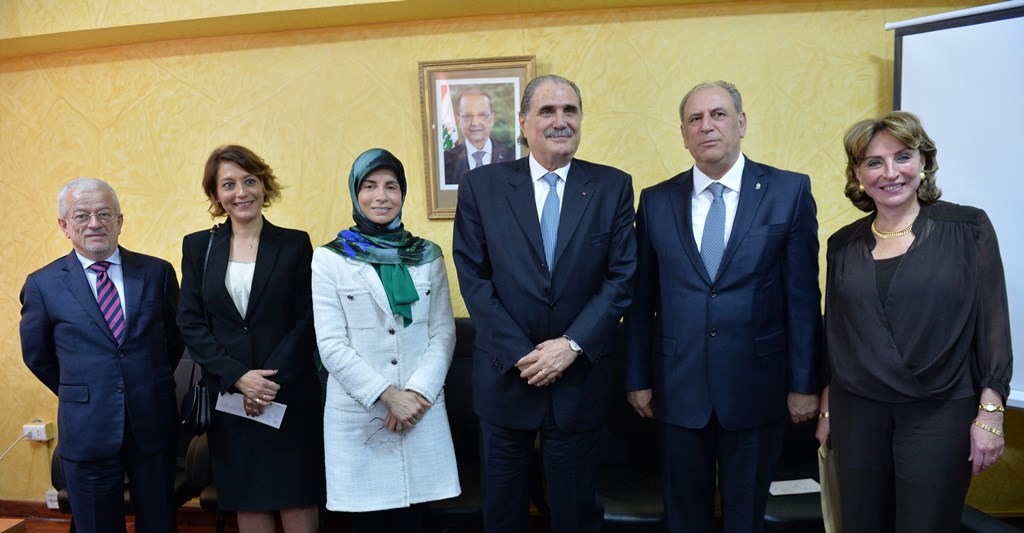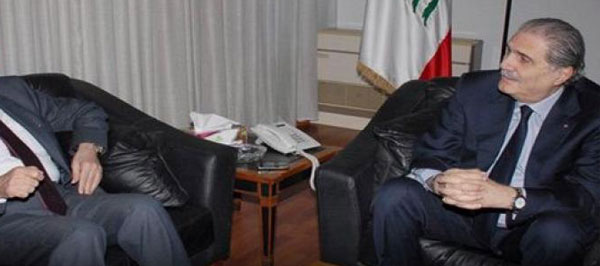MINISTRY DEPARTMENTS Back
Committee of Cases
Bodies of the Committee and Organizational Structure
President of the Committee of Cases
1.1.4.1.2 Assistant Judges
The assistant judges are appointed in the committee of cases by virtue of a decree issued upon the proposal of the Minister of Justice in order to help the president of the committee in facing the great number of files and studies of the judgments and the validity of challenge. And they are subject to control and supervision of the President of the Committee of cases.
1.1.4.1.3 Attorneys of the State
Province of Beirut:
Judicial Judiciary:
Province of Mount Lebanon:
Province of the North:
Province of the Bekaa:
Provinces of South and Nabatieh:
Tasks
Article 18 of the legislative decree number 151 dated 16/09/1983 amended by the legislative decree number 23 dated 23/03/1985 determined the tasks of the committee of cases as the following:
Work type and its procedures before the Committee of Cases
Type of work:
The work of the committee of cases varies in all types of lawsuits:
The work actions follow in succession in the committee of cases as the following:
President of the Committee of Cases
- A judge of the judicial judiciary staff of seventh grade at least or administrative judge of an equivalent grade will chair the committee of cases, appointed by virtue of a decree taken by the Cabinet upon the suggestion of the Minister of Justice. And the Minister of Justice, by a decision he may take and in the absence of the president of the committee, will be entitled to delegate one of the judges joined to the Ministry to dispose of the works of the committee.
- The president of the committee of cases will handle the representation of the state in Lebanon and abroad before all the judicial, administrative and arbitration courts of all degrees and functions as well as all the committees of judicial quality being in person or through one of his assistants among the judges of the committee or one of the state attorneys.
- While reserving all the authorities of the Director General of the Ministry of Justice, the president of the committee of cases will be considered as the direct administrative president of the employees and he has the right to practice all the authorities conferred upon him by the law to the Director according to the laws and regulations. He has the right as well to delegate some of his authorities to his assistants among the judges and attorneys.
- The president of the committee of cases is entitled to delegate the administrative employees and judicial assistants to appear before the courts of first instance, the executive departments and before all committees and commissions of judicial quality.
- The president of the committee of cases will be entitled to call all the competent administrations in all the matters concerning his committee and he has the right to ask it to undertake all what may enable him to accomplish the works of the committee.
- The president of the committee of cases is member of the Supreme Committee of Consultation and does not participate in the cases referred to it if the opinion is given by him.
- The judgments rendered in state cases shall not be notified but to the president of the committee in person or to whomever he may delegate among his assistant judges. In the absence of the president of the committee, the Minister of Justice may assign one of the committee judges to notify all provisions.
- The president of the committee organizes an annual report that he submits to the Minister of Justice through the director general and including all the notes and suggestions that he deems adequate.
- The current president of this committee of cases is the judge Hilana Eskandar.
1.1.4.1.2 Assistant Judges
The assistant judges are appointed in the committee of cases by virtue of a decree issued upon the proposal of the Minister of Justice in order to help the president of the committee in facing the great number of files and studies of the judgments and the validity of challenge. And they are subject to control and supervision of the President of the Committee of cases.
1.1.4.1.3 Attorneys of the State
- The Minister of Justice handles with a number of attorneys upon the proposal of the Director General and after consultation of the president of the Committee of Cases in order to help this latter in his tasks, provided that the contract will be given the final version by virtue of a decree that will determine the number of these attorneys including the attorney of the custom administration and the principles of contracting with them, their works and remunerations.
- The attorneys of state will ensure the response to the pleadings of lawsuits referred to them by the President of the Committee to legally pursue it and the responsive plea issued by it and referred to it and to ensure the attendance of the trial sessions scheduled for it before the courts. The attorneys send a semester inventory of the lawsuits referred to them and inform the committee of the process of these lawsuits and weekly hand the mail from the department of the committee.
- The number of the attorneys of state became, according to the decree number 14801 dated 20/06/2005, four attorneys in the first section which means the disputes settled through arbitration and thirty two attorneys in the second section which means the disputes before the judicial and administrative courts and the other committees of judicial quality.
Province of Beirut:
Judicial Judiciary:
- Attorney Abdel Majid Akoum
- Attorney Hafez Jaber
- Attorney Imad El Wazen
- Attorney Mona Baadarani
- Attorney Rafic Ghanem
- Attorney Abdo Lahoud
- Attorney Jamal El Zein
- Attorney Phillipe Awad
- Attorney Ghassan Chakour
- Attorney Lina Haddad
- Attorney Samir Tabet
- Attorney Joseph El Khoury
- Attorney Oussama Jaber
- Attorney Mohamad Chrim
Province of Mount Lebanon:
- Attorney Fadi Hnein (Jdeide)
- Attorney Tanios Daou (Jdeide)
- Attorney Elias Atta (Baabda)
- Attorney Mohamad El Chami (Baabda)
- Attorney Georges Haddad (Baabda)
- Attorney Laudy Nader (Jbeil, Kesrouan, Kartaba and its subsidiaries)
- Attorney Samir Halabi (Baakleen, Deir El Kamar, Chehim, Damour and its subsidiaries)
- Attorney Nabih El Jourdi (Aley and its subsidiaries)
Province of the North:
- Attorney Nabih El Halabi (Halba, Kobeyat and its subsidiaries)
- Attorney Georges Jallad (Zgharta, Batroun and its subsidiaries)
- Attorney Maan Abdel Sattar Kanj Houchar (Tripoli, Dinniye and its subsidiaries)
- Attorney Tarek El Ali (Tripoli, Dinniye and its subsidiaries)
Province of the Bekaa:
- Attorney Issam Maalouf (Bekaa Gharbi, Jib Jennin, Zahle, Rachaya and its subsidiaries)
- Attorney Miyad Haidar (Baalbek, Hermel and its subsidiaries)
Provinces of South and Nabatieh:
- Attorney Abdel Hamid El Zein (Saida and its subsidiaries)
- Attorney Mariam Skafi (Nabatieh, Marjeyoun, Hasbaya and its subsidiaries)
- Attorney Jawad Safieddin (Sour, Bint Jbeil, Tibnin, Joya and its subsidiaries)
Tasks
Article 18 of the legislative decree number 151 dated 16/09/1983 amended by the legislative decree number 23 dated 23/03/1985 determined the tasks of the committee of cases as the following:
- To bring the lawsuits in the name of the state and defend it in lawsuits brought against it inside and outside and to prepare the pleadings, pleas, warrants and sign them.
- To serve the pleadings, pleas, memorandums, judgments and decisions relevant to the lawsuits of state.
- To summon before all the judicial and administrative courts.
- To undertake all the works required by the defense for the interests of the state before the courts being plaintiff or defendant.
Work type and its procedures before the Committee of Cases
Type of work:
The work of the committee of cases varies in all types of lawsuits:
- Civil Status (Civil affairs, nationality)
- Civil, commercial and real estate.
- Administrative
- Criminal (personal action to claim the rights of the state and compensation, spent of public funds, embezzlement …)
- Arbitration lawsuits
- Conciliations
The work actions follow in succession in the committee of cases as the following:
- Every formality of any type received by the committee will be firstly recorded with one central register to verify the movement of the incoming and outgoing with a serial number with the symbol (C.D.) – Cases Department.
- Then, it will be distributed among the concerned units:
A- Unit of Judicial Lawsuits
B- Unit of Civil Status Lawsuits
C- Unit of Administrative Lawsuits
D- Mail of the President of the Committee (Direct) - The concerned unit takes care of the creation of every pleading in the special register concerning the determination of the names of litigants and the subject of the lawsuits, its type and number.
- The pleading is to be made in four photocopies at least to provide a copy to the attorney of the state or the judge who will be assigned of the lawsuit, one to the concerned administration, another one to the courts and one to be kept before the committee.
- The file will be presented to the president of the committee for notification where the president takes in charge to deal with personally or decides to transfer it to one of the attorneys or judges to work out the response and proceed to its legal follow up.
- Every response to the lawsuit from the litigant through the court stating the lawsuit will follow the same process concerning the registration and establishment and then the referral to be responded and followed up.
- Same thing concerning the responses of the attorneys that the unit of the attorney’s mail receives shall be delivered to the concerned unit and registered with the register of establishment in the page designed for the case. It shall be joined to the file which will be deposited to the place consecrated for the files.
- As to the notifications, after notifying the schedule of the sessions, petitions and the judgments by the president of the committee, they shall be returned to the courts situated in Beirut through a special court usher and officially delivered to the competent departments. As to the documents of notifications relevant to the courts located outside the circumscription of Beirut, they shall be sent via the registered mail.
- At the issuance of the judgment regardless the subject of the lawsuit, the same abovementioned procedures shall be followed where it shall be recorded as incoming and transferred to the competent unit which registers its incoming in the page consecrated for the lawsuit then the file will be withdrawn and attached to the judgment.
- The file will be presented to the president of the committee, since serving the judgments is limited to him only or to whomever he delegates to receive the notification explicitly, and to study the validity of appeals, and if he decides the appeal, a copy of the judgment shall be sent to the attorney or the judge assigned to adjudicate the lawsuit and to the administration concerned to present its examination thereto.





